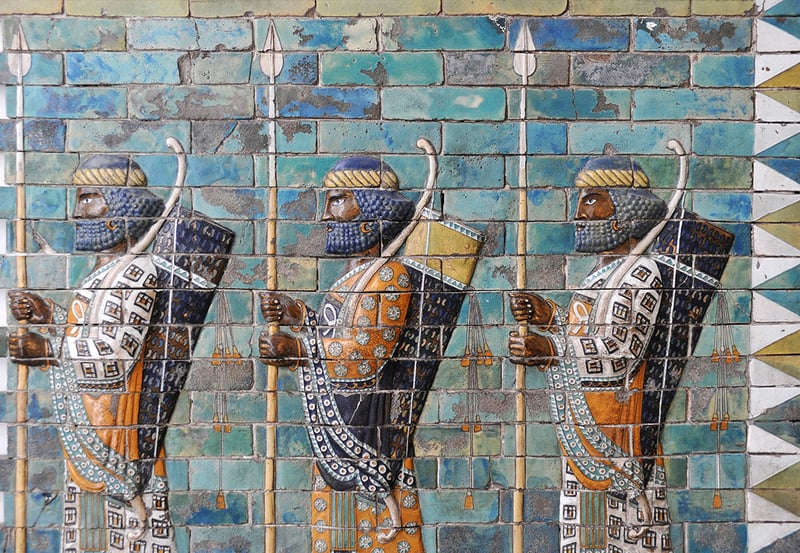While a great many biblical prophecies point to a future time, a number have already come to pass. Fulfilled prophecy is another proof that God exists.

Upwards of a third of the Bible is prophetic. Many of these prophecies relate to Jesus Christ’s second coming to establish the Kingdom of God. However, some prophecies focus on the current era and a number have already been fulfilled.
In this series of articles we have been looking at the question of God’s existence from the perspective of scientific evidence. In this article we turn to prophecy and history for proof.
In previous issues of Discern we outlined five proofs of the Bible. One proof is fulfilled prophecy (see the July/August 2015 issue). Among the fulfilled prophecies discussed were several related to Jerusalem and Babylon. These prophecies not only verify the Bible but also the existence of God. Babylon and Jerusalem have been linked in prophecies since the rise of the Babylonian Empire in the seventh century B.C.
Let’s look at some additional prophecies that help present a conclusive case for the existence of God.
A tale of two cities: fulfilled prophecies about Babylon and Jerusalem
Isaiah prophesied during the reign of four kings of Judah (Isaiah 1:1), beginning around 740 B.C.
Here is what God inspired Isaiah to prophesy about Babylon:
“Behold, I will stir up the Medes against them, who will not regard silver; and as for gold, they will not delight in it. Also their bows will dash the young men to pieces, and they will have no pity on the fruit of the womb; their eye will not spare children.
“And Babylon, the glory of kingdoms, the beauty of the Chaldeans’ pride, will be as when God overthrew Sodom and Gomorrah. It will never be inhabited, nor will it be settled from generation to generation; nor will the Arabian pitch tents there, nor will shepherds make their sheepfolds there” (Isaiah 13:17-20).
Note the four aspects of this prophecy:
- The Medes would attack.
- There would be a bloody conflict.
- Babylon would become desolate.
- Babylon would not be rebuilt (see also Jeremiah 25:12).
Here is how the history of Babylon unfolded.
Babylon had previously been destroyed by the Assyrian Empire. As the Assyrian Empire declined, Babylon was rebuilt as part of the Neo-Babylonian Empire that came to dominate the Middle East. The empire reached its height under Nebuchadnezzar (605-562 B.C.).

Then in 539 B.C. the Babylonian empire, along with Babylon itself, fell to an emerging empire consisting of Medes and Persians. But due to Persian dominance, it is often referred to as the Persian Empire. Babylon was conquered—fulfilling the first part of Isaiah’s prophecy—but it was not destroyed at this time.
The city continued to prosper for a while during the Persian rule. Around 482 B.C. the city rebelled against the Persians. King Xerxes recaptured the city, destroyed its temples and killed many. This bloody uprising seems to have fulfilled the second part of Isaiah’s prophecy.
The city began a long decline, culminating in its capture by Alexander the Great in 331 B.C. Alexander’s empire broke up into four parts at his death. His successors fought over the city, driving out many of the residents. The Seleucid Empire took control and built a new city, Seleucia, nearby; and Babylon was essentially abandoned.
By the time the Parthian Empire ruled the region in 141 B.C., Babylon was in a state of ruin, although there were still people living in and around the vicinity of the original city. By the time of the Muslim conquest in A.D. 650, evidence of Babylon was lost under the sands, fulfilling the third part of Isaiah’s prophecy. It was not until the 19th century that archaeologists even located the ruins.
In the early 1980s, while archaeologists were excavating the ruins, Saddam Hussein began to rebuild Babylon. To the despair of archaeologists, Saddam razed the ruins and began to build a few walled structures. At this time he also decided to build a majestic palace at the edge of the ruins, completing it shortly before the invasion of Iraq in 2003.
Saddam never moved into his palace. It was stripped and looted during and after the war and is now an empty shell.
The ruins of Babylon are still desolate. After 2,500 years, the fourth part of the prophecy has continued to be fulfilled.
Saddam was later hunted down and executed. Iraq remains in turmoil. The ruins of Babylon are still desolate. After 2,500 years, the fourth part of the prophecy has continued to be fulfilled.
The Bible does refer to an end-time Babylonian system that will be destroyed at Christ’s return, but this will be based in Europe, not in the ancient city in the Middle East. Read more about this in our online article “What Is Babylon?”
Prophecy is being fulfilled just as God said: “So shall My word be that goes forth from My mouth; it shall not return to Me void, but it shall accomplish what I please, and it shall prosper in the thing for which I sent it” (Isaiah 55:11).
Babylon, Jerusalem and the Messiah
While Babylon was to become desolate forever, Jerusalem was to be rebuilt, signaling a countdown to the Messiah. There is a detailed and complex messianic prophecy in Daniel 9:24-27 (see the Life, Hope & Truth article “70 Weeks of Daniel: What Does the Prophecy Mean?”).
Verse 25 reveals when to expect the Messiah. “Know therefore and understand, that from the going forth of the command to restore and build Jerusalem until Messiah the Prince, there shall be seven weeks and sixty-two weeks [for a total of 69 weeks]; the street shall be built again and the wall, even in troublesome times” (emphasis added throughout).
Obviously, the prophecy was not referring to actual weeks. However, God has used prophetic days to represent actual years (Ezekiel 4:4-6). Using the day-for-a-year representation, 69 weeks would equal 483 years. According to historical records, Persian King Artaxerxes I began his rule in 464 B.C. Ezra received permission to return to Jerusalem to complete the efforts to rebuild the city in the seventh year of Artaxerxes, 457 B.C. (Ezra 7:6-10; 9:9). Advancing 483 years (with the understanding that there was no year zero) would take us to A.D. 27—the year Christ was baptized and began His ministry!
These are only a few of the many fulfilled prophecies that confirm the existence of God. For more, see our articles “Fulfilled Prophecy,” “Fulfilled Prophecy Is Evidence of God’s Existence,” “Daniel’s Prophecies: Proof of God’s Existence” and “Daniel 11: The Most Detailed Prophecy in the Bible.”
Can you personally validate the fulfillment of a prophecy?
The discussion so far has related to unconditional prophecies that God guarantees. However, there are also conditional prophecies. These prophecies are in the form of “if—then.” The message is: If you obey God, then you will receive blessings.
For the ancient Israelites He promised: If “you shall keep the commandment, the statutes, and the judgments which I command you today, to observe them. Then it shall come to pass, because you listen to these judgments, and keep and do them, that the LORD your God will keep with you the covenant and the mercy which He swore to your fathers. And He will love you and bless you and multiply you” (Deuteronomy 7:11-13).
The first Psalm begins by expressing the prophecy this way. If one not only obeys the law but delights in it, “he shall be like a tree planted by the rivers of water, that brings forth its fruit in its season, whose leaf also shall not wither; and whatever he does shall prosper” (Psalm 1:3; see also 1 Chronicles 22:13).
This theme is expressed by most of the prophets. For example, Malachi emphasized one specific aspect: “‘Bring all the tithes into the storehouse, that there may be food in My house, and try Me now in this,’ says the LORD of hosts, ‘if I will not open for you the windows of heaven and pour out for you such blessing that there will not be room enough to receive it’” (Malachi 3:10).
Jesus summed up the message in Matthew 6:33: “But seek first the kingdom of God and His righteousness, and all these things shall be added to you.”
You can personally validate this conditional prophecy. In fact, the Bible challenges you to do just that! But it must be a true commitment to understanding and obeying not just the letter of the law, but its spiritual application. Not just following what you think the Bible teaches, but reading and studying to see for yourself.
Notice how David phrases the concept. “He who dwells in the secret place of the Most High shall abide under the shadow of the Almighty. … Surely He shall deliver you from the snare of the fowler and from perilous pestilence. He shall cover you with His feathers, and under His wings you shall take refuge; His truth shall be your shield and buckler” (Psalm 91:1, 3-4).
If you commit to the truth as outlined in the Bible, your life will change and you will be blessed. Our free booklet Change Your Life! can help. Download it from our Learning Center today.
Can there be any greater proof of God?
Try it!
For the previous article in this series, see “Does God Exist? Proof 3: The Origin of Life.”




